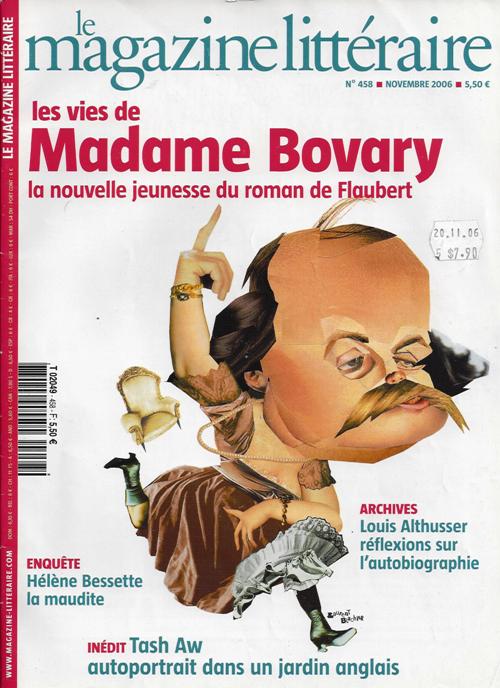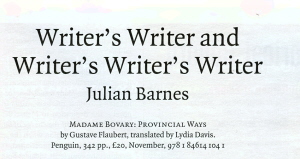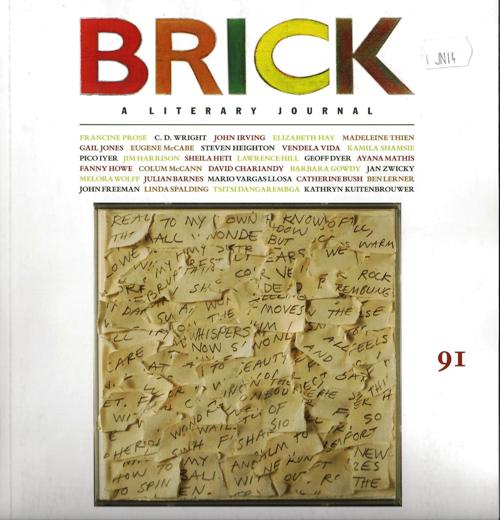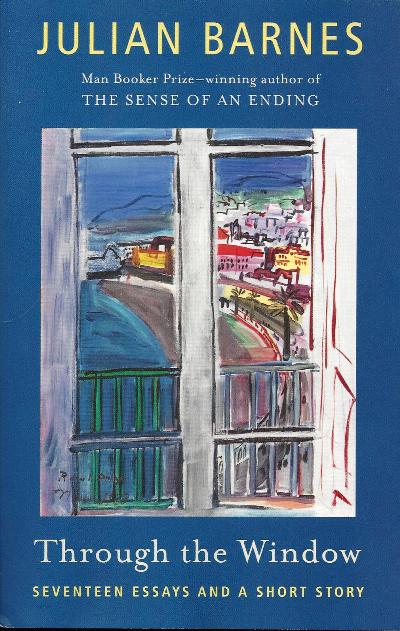|
|


GCC có mấy số
ML về Flaubert, số trên chắc là mới nhất. Trong có bài “Nghệ Thuật
Khinh Bỉ” đọc
cũng thú: Mặc dù văn phong khách quan, cuốn tiểu thuyết của Flaubert
nằm trong
truyền thống văn chương miêu tả những bất hạnh của cái xấu, cái ác, les
malheurs du vice. “Bà Bô” phải gợi ra lòng thương hại lẫn khinh khi,
nhưng
Flaubert không hề có ý định viết văn để ăn mày nước mắt độc giả, những
kẻ mủi
lòng vì số phận người đàn bà ngoại tình, mặc dù những bất hạnh giáng
xuống đời
Bà.
Số báo còn
hai bài, cũng thật tuyệt. “Sổ Đọc” của Vila-Maltas: Monsieur Mantra,
"l'irréalisme magique " de Rodrigo Fresán, và bài của Linda Lê,
trong
mục “Trở về với những tác giả cổ điển”: "Les Griffes du passé, Những
móng nhọn của quá khứ.
Hai mục này, Gấu
đều mê, nhưng sau này đều bị tờ ML bỏ đi.
Tiếc!
[Thuổng văn phong của Thầy Kuốc: Thích!]

Số Mùa
Hè,
2013. Báo nhà [Toronto]. Nhiều bài tuyệt lắm, hà hà!
Nhẩn nha đi vài đường, sau.
Một trong những đề tài của số này, là về
“cái gọi là”
kết thúc, the end, của 1 cuốn tiểu thuyết.
Flaubert
JULIAN BARNES
MARIO VARGAS
LLOSA

Note: Đọc
bài này, thì cũng nên đọc thêm bài Julian Barnes viết, trong tập tiểu
luận của
ông, Qua Cửa Sổ, Through the Window:
"Dịch Madame Bovary", Translating
Madame Bovary
[qua tiếng Anh]. Trong bài viết, ông có chê
bản dịch
mới của em Lydia Davis, được coi là 1 trong những chuyên gia về
Flaubert. Bà này, trên
1 số Paris Review, Fall, 2010, có đi mấy truyện ngắn, phỏng
theo
Flaubert, After Flaubert.
At the Hay
Festival if Literature and the Arts twenty years ago, Julian Barnes and
Mario
Vargas Llosa met to talk about Gustave Flaubert. In January 2013 at Hay
Festival Cartagena de Indias in Colombia, they discussed their hero
again-and
found that he had changed almost as much as they had. Marianne Ponsford
moderated their conversation.
Note: Hai
ông học trò, một ông Booker, một ông Nobel, vinh danh Thầy, cùng lúc,
viết về mối
tình của cả hai, với cùng 1 em bướm, Madame Bovary.
Flaubert
cried out against the paradox whereby he lay dying like a dog whereas
that
‘whore’ Emma Bovary, his creature… continued alive.
G. Steiner, The Uncommon Reader.
Flaubert la
lên, tại sao ‘con điếm’ Bovary cứ sống hoài, trong khi ta nằm đây, chết
như một
con chó ghẻ?
“Cái
chết của Lucien de Rubempré là một bi kịch lớn, the great drama, trong
đời tôi”, Oscar Wilde nhận xét về một trong những nhân vật của Balzac.
Tôi luôn coi lời phán này, this statement, là thực, literally true. Một
dúm nhân vật giả tưởng đã ghi dấu thật đậm lên đời tôi hơn những con
người bằng xuơng bằng thịt, bằng máu bằng mủ mà tôi đã từng quen biết.
Llosa
mở ra cuốn tiểu luận của mình The
Perpetual Orgy, "Đốt đuốc chơi... Em", như trên.
Cả một cuốn tiểu luận, dành cho Em Bovary, chưa đủ, sau ông còn viết cả
một cuốn tiểu thuyết, Gái Hư, The Bad
Girl, để vinh danh Em!
Số báo Brick,
trên, gồm bài viết của 44 tác giả
viết về cái hậu, the end, của 1 cuốn tiểu thuyết; Madeleine Thien, chắc
là Mít,
ở Montreal, phỏng vấn Tsiti Dangaremba, về cuốn tiểu thuyết đầu tay
thần sầu của
em này, hai ông nhà văn thổi bướm Bovary….
Trong 44 tác
giả, chưa có ai từng đọc Lukacs, theo Gấu, bởi là vì, Lukacs là người
đưa
ra 1 nhận định cực
thần sầu về cái kết, của 1 cuốn tiểu thuyết:
Đó là lúc ý thức của tiểu
thuyết
gia vượt ý thức của nhân vật chính, để tìm lại đời sống thực.
Trong bài viết về Bếp Lửa, 1972, Gấu
“đế” thêm: Đây là hình ảnh Lưu Nguyễn về trần, bởi là vì, mỗi một
cuốn tiểu thuyết lớn, thì là 1 câu chuyện thần tiên, đúng như Nabokov
phán, khi
viết về Madame Bovary của Flaubert.
Cả cuốn Bếp
Lửa [cuộc sống của anh chàng Tâm trong "Bếp Lửa"], thật khệnh
khạng [đi ra ngoài
đó - lên rừng, theo VC – thì cũng chỉ là 1 thứ đánh đĩ], thật kịch cợm,
thật trí
thức, thật siêu hình [giả như Thượng Đế mà nhập thân trong xác phàm,
thì cũng từ
chết đến bị thương, từ thua cho tới thua, và chỉ thoát ra bằng sự thất
bại], một
câu chuyện "thần tiên", kết bằng 1 câu thật cảm động, thật sến, mà tất
cả
lũ Mít
đều thèm nghe:
Anh yêu quê
hương vô cùng và anh yêu em vô cùng.
Trong 44 tác
giả, tuyệt nhất với Gấu, là Pico Iyer, viết về kết thúc của Người Mỹ
Trầm Lặng của
Graham Greene.
Pico
Iyer mở
ra bài viết bằng 1 câu, qua đó, có vẻ như cũng thật mê
Greene (1)
Tôi mất cả nửa
đời mình để nhập vô cuốn phúc âm nhức nhối của Graham Greene về nhân
loại.
It took me
half a life time to grow into Graham Greene’s anguished gospel of
humanity.
Tuyệt!
Tờ Brick
viết về Pico Iyer:
Pico Iyer cố
làm bật G.G khỏi hệ thống của mình bằng cách viết ba ngàn trang về G.G,
tới cuốn
mới nhất: “Người đàn ông trong đầu tôi”. Nhưng vưỡn thua.
Pico Iyer
tried to get Graham Greene out of his system by writing three thousands
pages
on him, boiled down into his most recent book, The Man Within My Head
(a). He still
failed
“Writing is,
in the end, that oddest of anomalies: an intimate letter to a stranger.”
Viết, quái nhất trong những quái: Lá thư riêng tư cho... một kẻ lạ,
người dưng, nước lã!
― Pico Iyer
“Perhaps the
greatest danger of our global community is that the person in LA thinks
he
knows Cambodia because he's seen The Killing Fields on-screen, and the
newcomer
from Cambodia thinks he knows LA because he's seen City of Angels on
video.”
Cái nguy hiểm
nhất của cộng động toàn cầu, là, ngồi ở LA phán, tớ biết Cam bốt, vì
mới xem
phim “Cánh đồng giết người”. Và 1 tên Cam bốt mới nhập Mẽo phán, tớ
biết LA, vì
mới coi video “Thành phố của những thiên thần”
― Pico Iyer (1)
“Ông số 2”, ngồi ở Quận Cam, chẳng đã ngậm ngùi phán, Sài Gòn có người
chết đói, ngay bên hông Chợ Bến
Thành!
(a)
The Man
Within My Head by Pico Iyer
We all
carry
people inside our heads—actors, leaders, writers, people out of history
or
fiction, met or unmet, who sometimes seem closer to us than people we
know.
In The Man
Within My Head, Pico Iyer sets out to unravel the mysterious
closeness he has
always felt with the English writer Graham Greene; he examines Greene’s
obsessions, his elusiveness, his penchant for mystery. Iyer follows
Greene’s
trail from his first novel, The Man
Within, to such later classics as The Quiet
American and begins to unpack all he has in common with Greene:
an English
public school education, a lifelong restlessness and refusal to make a
home
anywhere, a fascination with the complications of faith. The deeper
Iyer
plunges into their haunted kinship, the more he begins to wonder
whether the
man within his head is not Greene but his own father, or perhaps some
more
shadowy aspect of himself.
Drawing upon
experiences across the globe, from Cuba to Bhutan, and moving, as
Greene would,
from Sri Lanka in war to intimate moments of introspection; trying to
make
sense of his own past, commuting between the cloisters of a
fifteenth-century
boarding school and California in the 1960s, one of our most
resourceful
explorers of crossing cultures gives us his most personal and
revelatory book.
It is still
beautiful to feel the heart beat
but often
the shadow seems more real than the body.
The samurai looks insignificant
beside his
armor of black dragon scales.
Thì
vưỡn đẹp khi cảm thấy trái tim đập
Nhưng thường là cái bóng có
vẻ thực hơn cơ thể
Vì samurai xem ra chẳng có ý
nghĩa gì
Bên cạnh bộ giáp với những vẩy
rồng đen thui của ông ta.
Note: Bài thơ thần sầu.
Gửi theo ông anh quá tuyệt. Bảy năm rồi, xác thân nào còn, linh hồn thì
cũng có khi đã đầu thai kiếp khác, hoặc tiêu diêu nơi miền cực lạc.
Nhưng cái bóng thì lại càng ngày càng lớn, dội cả về Đất Cũ:
VC bi giờ
coi bộ trân
trọng cái bóng của ông cùng cái áo giáp, mấy cái vảy rồng đen thui, còn
hơn cả đám bạn quí hải ngoại của ông! (1)

Nhẩn nha đi vài đường, sau. Một trong những đề tài của số này, là về
“cái gọi là”
kết thúc, the end, của 1 cuốn tiểu thuyết.
Flaubert
JULIAN
BARNES
MARIO VARGAS
LLOSA
At the Hay
Festival if Literature and the Arts twenty years ago, Julian Barnes and
Mario
Vargas Llosa met to talk about Gustave Flaubert. In January 2013 at Hay
Festival Cartagena de Indias in Colombia, they discussed their hero
again-and
found that he had changed almost as much as they had. Marianne Ponsford
moderated their conversation.
Ponsford:
What has changed for you in your appreciation of Flaubert in the past
twenty
years?
Barnes:
I
suppose there are two parts to the answer: what has changed with
Flaubert, and
what has changed with me. Rather surprisingly, Flaubert, despite being
dead for
133 years, is still changing. That's to say, the corpus is still
expanding. In
the last twenty years, the magnificent Pleiade edition of the Correspondance
has been completed, and so we can now read almost every single letter
of his
that has survived. And the correspondence is the place to find Flaubert
the
human being and is to be read side by side with the novels. It's a
great work
of art in itself. Other things that have been published: the Pléiade
produced
the Oeuvres de jeunesse for
the first time in a complete
format-everything he
published before Madame Bovary.
It's a fat volume that has more words
in it
than all the books he published in his lifetime. And it also proves
that if
Flaubert had died in 1850 or 1851, before he'd started writing Madame
Bovary,
no one would say, We have lost a genius.
Also what
has changed with Flaubert is new translations-some of them are an
improvement
and some of them are not. I don't follow the academic discourse, but in
the
world of amateur Flaubert scholarship amazing books keep coming out.
One
arrived on my desk the other day: it is a dictionary of all the words
that
appear in Madame Bovary. In
order. Every time the word crops up, it is
listed.
So you get “I” and you have “la” and “le” and "lui," and there are
eleven pages, each of six columns-2,027
entries in all-going "la la la la la"-like we're in a demented opera
house. You look at it and you think, What is this for? There's a very
French
introduction to it, which says, This is perhaps a work suited to the
Oulipo
school, whereby if we put all the words of Madame
Bovary into a book, in alphabetical order, you the reader can then
manufacture
your own novel using only the words that are in the original. Crazy, or
what?
So that's
how Flaubert has changed. For myself, I continue
to read him, and I find that I do read the books differently, still. I
go back
the most often to Madame Bovary, and I still find, in its
adamantine
perfection, that there are new things to discover, things I had not
noticed
before. Bouvard et Pecuchet now
stands clearer and greater
in my mind because I think I'm beginning finally to understand what
it's about. It's not a
book to read when you're a young man.
Llosa: No.
Barnes: So partly he's changed,
and partly
I've changed.
Llosa: I'd like to add a
footnote to what
Julian said. It's a fact I read not long ago and which pleased me
enormously.
It was about the number of critical works generated by French authors
worldwide,
and Flaubert came' out third. After Victor Hugo and Montaigne, it was
Flaubert
who produced the most critical works, university theses, essays,
scholarly
tomes. And on the personal front: I continue to reread, sometimes
fragments, of
Flaubert, and he is a writer who has never disappointed me and has
always moved
me. I even reread scenes that are already very clear in my mind, some
of themfor
their literary intelligence. The scene I always reread-and particularly
when I’m
depressed-is Madame Bovary's suicide. For a
strange reason, which a psychoanalyst could no doubt explain to me one
day. Why
is it that that scene, which is so atrociously sad, the scene in which
Madame
Bovary swallows the arsenic, and there's that truly chilling
description of
what happens to her face, her mouth, her tongue ... How is that a scene
that
draws me out of my own misery and demoralization and makes me feel
somehow
reconciled to life? I'm not joking. In periods of great depression in
my life
I've gone back to read the suicide scene in Madame
Bovary-and the perfection, the mastery, the beauty with which that
horror
is described is so great that I feel an injection of enthusiasm, a
justification
for life itself. Life is worth living, if only to read the sort of
skill to be
found in those pages –the extraordinary lucidity, intelligence,
dexterity,
intuition with which he was able to bring to life a scene which, told
straight,
would produce a rejection of and a distaste for life. Julian, does that
scene
have the same emotional effect on you?
Barnes:
Um,
I don't go to it when I'm depressed. I think I'd turn to music rather
than
literature. But I think I'm a Simpler and less perverse human being
than you
are. But going back to what we were saying about how Flaubert has
changed and
how he's viewed. I've been thinking about how when you and I first read
him, he
was really rather unfashionable. I think he was a victim of political
correctness from the Left, partly because he said harsh things about
the
Commune, and partly because he was after all a rentier. He didn't
really live
off his writing, he lived off the income from his family and property
and so
on, and he could be dismissed as a bourgeois-in fact he was resolutely
anti-bourgeois. Fifty years ago he was read in schools, but afterwards
you were
sort of meant to forget him.
Llosa:
I
remember that atrocious phrase of Sartre's against Flaubert: "I hold
Flaubert responsible for the crimes committed against the Communards,
because
he never wrote a word condemning them." Which reveals very well that
rejection of Flaubert by the Left at a certain moment.
Barnes:
Yes.
It was political, and it was also aesthetic. In his autobiography, Les
Mots,
Sartre writes of being "poisoned by the old bile" of Flaubert and
Edmond de Goncourt and Theophile Gautier. They were the enemy, who had
to be
wiped from the battlefield. I've only read the first of his three
volumes about
Flaubert, L'Idiot de la famille, and it's a kind of monstrous work.
It's always
struck me as an attempt to bury Flaubert. As if he said, I'm going to
erect
this enormous monument to Flaubert, which will be so vast, and so
Sartrean,
that everyone will forget who's buried underneath. But he failed.
Llosa:
Even
Sartre recognized that Flaubert was the first modern novelist, in the
sense
that he gave rise to a certain model of novel that continues to this
day. There
were great novelists in the nineteenth century, but they didn't enrich
the
novels of the future in the way that Flaubert's teachings did. He
created a
whole technique for the invisibility of the narrator-a commitment to
finding
the exact word, so that the reader was not distracted either by exact
word or
by absence. We have to rearrange our sense of realism when we anything
published earlier. The contemporary novel was born with Flaubert, and
in that
sense all novelists are Flaubertians now, whether we like Flaubert or
not.
Barnes:
Yes,
I'd agree with all of that, and I'd add his clever and subtle use of
irony, and
his deployment of the style indirect libre, which he developed to a
point of
perfection that had not been there before. Also, he was, for me, the
novelist
who promoted the absolute importance of form in the novel. If we
compare the
Flaubertian method with what British novelists were doing at the
time-Dickens,
Thackeray, Trollope, George Eliot-there's one practical difference.
Their
novels mostly appeared first in monthly parts, and they would write
them as
they went along. They would be, essentially, brilliant episodes which
were then
bound up into a novel. I think a lot of novelists, pre- and
post-Flaubert, have
a very loose and fuzzy sense of what form is. Some think it's just
telling a
story, and going along until it ends-that structure is only important
when
writing a sonnet or something. I remember the wonderful thing that
Virginia
Woolf said about Dickens. She compared a Dickens novel to a blazing
fire, which
sometimes seems to be dying down, whereupon Dickens suddenly creates a
perfectly formed new character and chucks him or her onto the fire,
which
blazes up again and the novel takes off. Which is responding to the
particular
needs of writing weekly episodes.
Although Madame
Bovary was
published in the Revue de
Paris in periodical form, Flaubert had already finished it, and
he never
published anything until it was formally complete. What I see
increasingly as I
understand more about novels and write more novels is the way in which
things
are held together. For example, there's a tiny character in Madame
Bovary called Justin. He's the
assistant to Monsieur Homais, the
pharmacien. The main function of Justin in the book is to help
Madame
Bovary steal and swallow the arsenic. And when you read the book for
the first
time, that's probably the only time you properly take account of him.
But
Justin is there for three-quarters of the novel in very tiny
touches-often seen
in doorways looking at scenes. All these touches, when put together,
add up to
a sort of parallel seduction, and parallel corruption, of Justin by
Emma. At the
end, he's the person who is seen weeping on her grave. His presence,
and his
subtle underlinings, are a way of stitching the novel together, which
you can
do only if you have a great sense of architecture. And great architects
sometimes design the door handles as well as the walls.
Llosa:
I'd
like to touch on another aspect of Flaubert, which is his attempt to
achieve the
impossible. I think that Bouvart et Pécuchet is a
novel which proposes to do something unachievable,
a novel that is
born condemned to disaster. But it has aspired to so much and gone so
far, that
even though it doesn't reach its goal, the work is extraordinary,
unusual.
Well,
there's a thread in modern literature that is in some way encapsulated
by that
insane attempt of Flaubert's to write a novel that synthesized all the
knowledge
of his time. Joyce-a great admirer of Flaubert, as
were Proust and Kafka-wrote, after he finished Ulysses,
Finnegan Wake, a novel that is almost impossible to read
and impossible to finish. In Spanish we have
Paradiso, by Lezama Lima. I think that had never happened before
Flaubert-a
truly great, unfinished, and frustrated masterpiece like
Bouvard et Pécuchet. That too is a branch of his influence.
Ponsford :
I'd like to return to Madame Bovary, the character.
She was a
frivolous, vain-
Llosa: No! I protest!
Ponsford: -irresponsible, volatile
woman-
Llosa: That's a lie. Slander!
Barnes: Mario-
Llosa:
No,
wait! I'm going to defend Madame Bovary! She
was just a young girl who read romantic fiction. And she thought that
life was
as it was depicted in novels. And her tragedy, her drama, is that she
wanted to
turn that fiction into reality. Like Quixote-who read books about
chivalry,
thought life was as it was in those, and set out to transform reality
into
something resembling fiction. That's what Madame Bovary does. She wants
life to
be made of extraordinary passions that lead one to have great
adventures, she
wants life to be about pleasure-the pleasure of elegance, of
extravagance, of
sensuality; the pleasure of the sentimental excesses of passion. That's
what
she wants to bring about with her deeds, and what does she find all
around her?
Mediocrities- poor devils who are incapable of living at the level of
sensitivity
and imagination that she has been taught by fiction. That's the great
symbolism
of Madame Bovary, what makes it not
just a little realist novel but a novel that expresses a fundamental
element of
the human condition: our inability, as human beings, to accept reality
as it
is. Our profound need to live in another way-not to have just this one
life.
It's why we read fiction. Throughout history there have been people
like Don
Quixote and Madame Bovary, and the world has changed and progressed:
we've come
out or the caves and reached the moon, thanks to those crazy fools.
Madame
Bovary wasn't frivolous. She was a
great dreamer, a great rebel, an absolutely extraordinary and admirable
woman.
Barnes: I had failed to inform
our
moderator that Mario has
been in love with Emma Bovary for forty or fifty years.
Llosa: It's true, absolutely.
Barnes: I too react-though not
with quite
such personal feeling as you do-when readers complain that Madame
Bovary is a
trivial person. She is the only person in the novel who attempts to
extract herself
from her circumstances. She's the only person who acts with boldness
and
courage, in difficult social circumstances for a woman. The men in
Madame
Bovary are all cowards. She is not a coward, either in love or in sex,
and they
don't measure up to her. People sometimes say, "I don't like Madame
Bovary."
Someone even complained to me that she was" a bad mother." And you
think: What's that got to do with anything? You know, Hamlet: he
couldn't make
up his mind. King Lear: mad as a hatter. You don't go to great
literature in
order to like people, to find chums. This is the Oprah-fication of
literature.
But I yield to you, Mario, in your passion for Madame Bovary. I respect
her, I
admire her, I might even fancy her, but you can have her in that
carriage.
|
|





